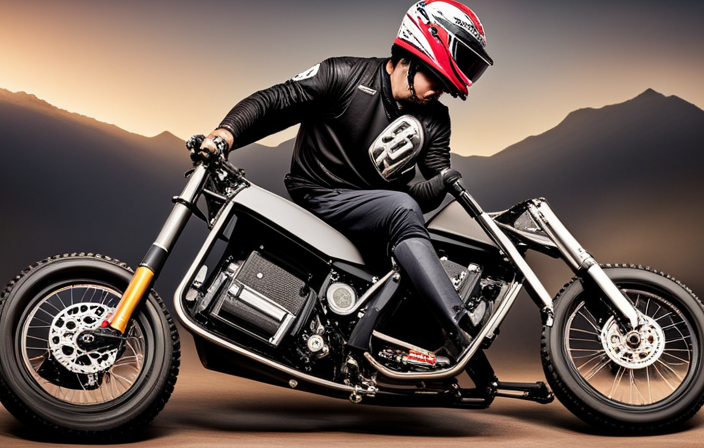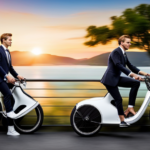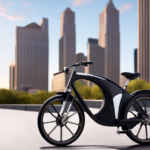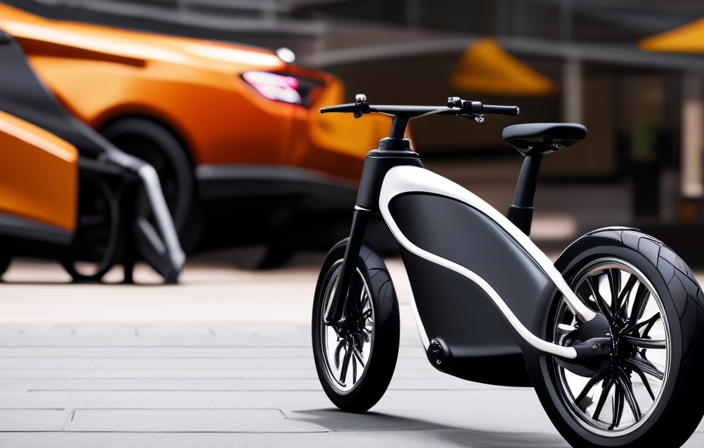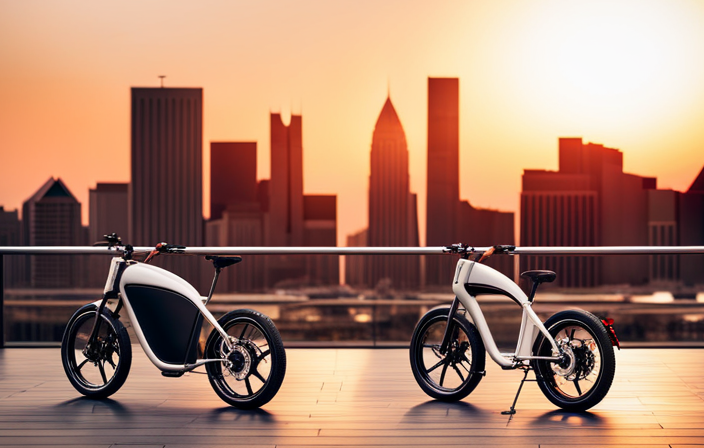As a New Jersey resident, I have always been interested in the rules and regulations regarding electric bicycles. What exactly classifies as an electric bike in NJ? This article will delve into the regulations, licensing criteria, and safety guidelines that oversee electric bicycles in the state.
We’ll explore where you can ride these bikes and the benefits they offer to the people of New Jersey. So, if you’re thinking about getting an electric bike, join me on this informative journey to discover everything you need to know.
Key Takeaways
- Electric bikes in New Jersey are defined based on motor type and maximum speed, with a maximum power output of 750 watts and a maximum speed of 20 miles per hour on a level surface.
- Riders must be at least 15 years old and possess a valid driver’s license, moped license, or motorcycle endorsement to operate an electric bike in NJ.
- Electric bikes in New Jersey are not required to be registered like motor vehicles, but it is recommended to keep proof of ownership and warranties.
- Electric bikes must have specific equipment like a horn, rearview mirror, and headlight, and riders must wear a helmet and adhere to safety regulations such as obeying traffic laws and yielding to pedestrians.
Overview of Electric Bike Regulations in New Jersey
In New Jersey, there are specific regulations that govern the use of electric bikes. These regulations include licensing requirements and guidelines that ensure the safe and responsible use of electric bikes in the state.
To legally ride an electric bike in New Jersey, individuals must be at least 15 years old and possess a valid driver’s license, a moped license, or a motorcycle endorsement.
The benefits of electric bikes in NJ are numerous. They offer a more eco-friendly and cost-effective mode of transportation compared to traditional vehicles. Electric bikes also provide an opportunity for individuals to engage in physical activity while commuting, promoting a healthier lifestyle. Additionally, electric bikes can help alleviate traffic congestion and reduce carbon emissions.
Understanding the regulations and benefits of electric bikes in NJ is crucial before delving into the definition of an electric bike in New Jersey.
Definition of an Electric Bike in New Jersey
To understand what classifies as an e-bike in New Jersey, you need to be aware of the specific regulations and requirements set by the state. Electric bike regulations in New Jersey are defined by the type of motor and the maximum speed capability of the bike. According to the New Jersey Division of Highway Traffic Safety, an electric bike is considered a bicycle if it has a motor with a maximum power output of 750 watts (1 horsepower) and a maximum speed of 20 miles per hour on a level surface. Additionally, the motor must only engage when the rider is pedaling.
These regulations ensure that electric bikes in New Jersey maintain a similar functionality and safety as traditional bicycles, while also offering the benefits of electric assistance.
Transitioning into the subsequent section about licensing and registration requirements, it is important to understand how these regulations impact the legal obligations for e-bike riders.
Licensing and Registration Requirements
Make sure you’re aware of the licensing and registration requirements for e-bikes in New Jersey.
In order to legally operate an electric bike in the state, you must follow the proper licensing process and register your vehicle. The licensing process involves obtaining a Class I, II, or III electric bicycle endorsement on your driver’s license. This can be done by passing a knowledge test and paying the required fees.
As for registration, e-bikes in New Jersey are not required to be registered like motor vehicles. However, it is recommended that you keep proof of ownership and any applicable warranties or warranties for your e-bike.
Now, let’s turn our attention to the equipment and safety standards for electric bikes in New Jersey.
Equipment and Safety Standards
Following the proper equipment and safety standards is crucial when operating an e-bike in New Jersey. The state has specific regulations in place to ensure the safety of riders and others on the road.
E-bikes must be equipped with specific equipment, such as a horn or bell, a rearview mirror, and a headlight that provides visibility up to 500 feet. Additionally, riders are required to wear a helmet and are encouraged to wear reflective clothing. It is important to adhere to these equipment standards to prevent accidents and promote safe riding practices.
Along with equipment requirements, New Jersey has safety regulations that e-bike riders must follow, such as obeying traffic laws and yielding to pedestrians. By adhering to these standards, riders can enjoy the benefits of e-bikes while ensuring the safety of themselves and others.
Now, let’s explore where electric bikes are allowed in New Jersey.
Where Electric Bikes are Allowed
When it comes to the topic of electric bikes and where they are allowed, there are two key points to consider. The first is bike lanes and paths. These designated areas are specifically for cyclists and can provide a safe and convenient route for electric bike riders. It is important for electric bike riders to be aware of these bike lanes and paths and take advantage of them when available.
The second key point to consider is roadway restrictions. Some roads or highways may not permit electric bikes due to safety concerns. It is important for electric bike riders to understand these restrictions and avoid riding on roads where electric bikes are not allowed.
Bike Lanes and Paths
Bike lanes and paths in NJ are designed to accommodate electric bikes. This is an essential aspect of promoting sustainable transportation options and encouraging the use of electric bikes as a means of commuting.
The presence of bike lanes and paths allows for safe and efficient travel for not only electric bike riders but also for cyclists in general. In recent years, there has been a significant increase in bike sharing programs across the state, which further highlights the need for dedicated infrastructure for electric bikes. These programs rely on the availability of bike lanes and paths to ensure accessibility and convenience for users.
Moreover, the inclusion of electric bike infrastructure in these areas promotes a cohesive and integrated transportation network that caters to the needs of various commuters.
As we explore the topic of electric bikes in NJ further, it is important to consider the roadway restrictions that apply to these vehicles.
Roadway Restrictions
The presence of dedicated infrastructure for electric bikes in New Jersey promotes a cohesive and integrated transportation network that caters to the needs of various commuters. Roadway restrictions play a crucial role in ensuring roadway safety and regulating the speed limits for electric bikes.
In New Jersey, electric bikes are subject to the same rules and regulations as traditional bicycles. This means that they are typically allowed on bike lanes and paths, but not on highways or sidewalks. It is important for electric bike riders to adhere to the designated speed limits and exercise caution when sharing the road with other vehicles. By following these regulations, riders can contribute to a safer and more efficient transportation system.
Moving on to riding and operating an electric bike…
Riding and Operating an Electric Bike
Operating an electric bike requires knowledge of the local regulations and proper riding techniques. To ensure a safe and enjoyable ride, here are three key tips to keep in mind:
-
Mastering riding techniques: Electric bikes have different handling characteristics compared to traditional bicycles. It’s important to practice and get comfortable with the bike’s acceleration, braking, and maneuvering capabilities. This includes understanding how to properly use the electric assist feature and adjust the power settings to match your riding style.
-
Battery life optimization: Electric bikes rely on a battery for power. To maximize your ride time, it’s essential to optimize battery usage. This can be achieved by avoiding excessive acceleration or using high power settings unnecessarily. Additionally, maintaining the battery’s charge level and following proper charging practices will help prolong its lifespan.
-
Safety precautions: Just like any other cyclist, wearing a helmet and following traffic rules are vital when riding an electric bike. Be aware of your surroundings, use hand signals, and stay visible to motorists. It’s also important to regularly inspect your bike for any mechanical issues and ensure that the brakes, lights, and tires are in good working condition.
Benefits of Electric Bikes in New Jersey
As an avid cyclist and environmental enthusiast, I’m excited to discuss the benefits of electric bikes in New Jersey. I’ll focus on their environmental impact and the health and fitness benefits they offer.
Electric bikes are a sustainable transportation option that can significantly reduce carbon emissions and air pollution. This makes them a great choice for eco-conscious individuals. By using electric bikes instead of traditional vehicles, we can help to improve air quality and reduce our carbon footprint.
In addition to their environmental benefits, electric bikes also provide an excellent opportunity for people to engage in physical activity. Riding an electric bike requires pedaling, which promotes better cardiovascular health and overall fitness. It’s a fun and enjoyable way to incorporate exercise into our daily routines.
Environmental Impact
You can reduce your environmental impact by riding an electric bike instead of driving a car in NJ. Electric bike technology has come a long way in recent years, making them a viable and eco-friendly transportation option. Here are three reasons why choosing an electric bike can have a positive impact on the environment:
-
Zero emissions: Electric bikes produce zero tailpipe emissions, which means they don’t contribute to air pollution. By riding an electric bike, you can help improve the air quality in your community and reduce your carbon footprint.
-
Energy efficiency: Electric bikes are more energy-efficient than cars. They use significantly less energy per mile traveled, making them a greener choice for short-distance commuting or running errands.
-
Government incentives: In an effort to promote sustainable transportation, the government offers various incentives for electric bike owners. These incentives can include tax credits, grants, or subsidies, further encouraging individuals to choose electric bikes over cars.
Health and Fitness Benefits
By incorporating regular exercise into your routine, it’s easy to see how riding an electric bike can have a positive impact on your overall health and fitness. Electric bike technology has revolutionized commuting, making it a convenient and eco-friendly option for many. But beyond its environmental benefits, an electric bike can also provide significant health and fitness advantages.
Here’s a table that highlights some of the key health and fitness benefits of riding an electric bike:
| Health Benefit | Fitness Benefit | Impact on Commuting |
|---|---|---|
| Low impact on joints and muscles | Increases cardiovascular endurance | Reduces time spent in traffic |
| Enhances mental well-being | Improves leg strength and muscle tone | Saves money on transportation costs |
| Reduces stress levels | Burns calories and aids weight loss | Provides a fun and enjoyable form of exercise |
Transitioning into the subsequent section about popular electric bike models in New Jersey, it’s important to explore the different options available to riders.
Popular Electric Bike Models in New Jersey
When it comes to popular electric bike models in New Jersey, there are several key points to consider.
First, the features and specifications vary depending on the brand and model. Some bikes may have a higher top speed or longer battery life, while others may offer more advanced suspension or customizable settings.
Second, the price range for electric bikes in New Jersey can vary greatly. Entry-level models can be found for around $1,000, while high-end models can cost upwards of $5,000.
Features and Specifications
To understand the features and specifications of an electric bike in NJ, it’s important to consider factors such as motor power, battery range, and pedal-assist levels. These elements play a crucial role in determining the overall performance and functionality of an electric bike.
When it comes to electric bike features, there are several key aspects to consider:
-
Motor Power: The motor power determines the speed and acceleration capabilities of the bike. A higher wattage motor will provide a more powerful and efficient ride.
-
Battery Range: The battery range indicates how far you can travel on a single charge. A longer battery range allows for extended rides without needing to recharge.
-
Pedal-Assist Levels: Different electric bike models offer varying levels of pedal-assist, which provide varying levels of assistance while pedaling.
Considering these features and specifications allows riders to choose an electric bike that aligns with their specific needs and preferences.
Now, let’s explore the price range and availability of electric bikes in NJ.
Price Range and Availability
The price range and availability of electric bikes in NJ can vary depending on the brand and model. There are several electric bike brands that offer a range of options to suit different budgets and preferences.
For example, you can find affordable electric bikes from brands like Ancheer and Swagtron, which are perfect for those on a tighter budget. On the other hand, if you’re looking for a top-of-the-line electric bike, brands like Specialized and Trek offer high-quality models with advanced features.
When it comes to financing options, many electric bike retailers in NJ offer flexible payment plans and financing options to make purchasing an electric bike more affordable.
Now that we’ve covered the price range and availability, let’s dive into some tips for choosing the right electric bike in New Jersey.
Tips for Choosing the Right Electric Bike in New Jersey
If you’re looking for the right electric bike in New Jersey, consider these tips.
Maintaining an electric bike is crucial for its longevity and performance. Regularly check the tire pressure, brakes, and battery to ensure a smooth and safe ride. Cleaning the bike after each use and keeping it protected from extreme weather conditions will also help in preserving its quality.
Additionally, commuting with an electric bike offers numerous advantages. It is a cost-effective and environmentally friendly mode of transportation, reducing both fuel consumption and carbon emissions. Electric bikes are also versatile, allowing you to navigate through traffic easily and effortlessly.
With these tips in mind, you can make an informed decision when choosing the right electric bike for your needs.
When it comes to resources for electric bike owners in New Jersey, there are a variety of options available.
Resources for Electric Bike Owners in New Jersey
When it comes to owning an electric bike in New Jersey, it’s important to know where to go for local shops and dealerships. These establishments can provide valuable expertise and assistance when it comes to purchasing the right electric bike for your needs.
Additionally, having access to reliable maintenance and repair services is crucial in order to keep your electric bike in top condition and ensure its longevity.
Local Shops and Dealerships
There’s a great selection of electric bike options available at local shops and dealerships in NJ. These establishments not only offer a wide range of models to choose from, but they also provide valuable resources for electric bike owners.
One aspect that sets these shops apart is their involvement in local events and community outreach. They often organize group rides and participate in cycling events, fostering a sense of community among electric bike enthusiasts. Additionally, they offer workshops and clinics to educate riders on maintenance and repair techniques. This ensures that owners have the knowledge and skills to properly care for their bikes.
Transitioning into the next section, these shops also provide professional maintenance and repair services to ensure that your electric bike is always in top condition.
Maintenance and Repair Services
One aspect that sets these local shops and dealerships apart is the range of maintenance and repair services they offer for electric bikes.
When it comes to maintaining an electric bike, these shops are well-equipped and knowledgeable. They offer a variety of services, including routine maintenance such as battery checks and tire rotations, as well as more complex repairs like motor replacements and controller troubleshooting.
These professionals understand the intricacies of electric bikes and can provide valuable insights and tips for troubleshooting common issues. Whether it’s a faulty brake system, a malfunctioning display, or a drained battery, these local shops and dealerships have the expertise to diagnose and fix the problem efficiently.
With their comprehensive maintenance services and troubleshooting tips, they ensure that electric bike owners can enjoy a smooth and hassle-free riding experience.
Frequently Asked Questions
Are electric bikes allowed on sidewalks in New Jersey?
In New Jersey, electric bikes are not allowed on sidewalks. This is to ensure electric bike safety and prevent accidents with pedestrians. However, electric bikes provide numerous benefits such as eco-friendliness, reduced traffic congestion, and improved health.
Can electric bikes be used on bike paths and trails in the state?
Yes, electric bikes can be used on bike paths and trails in New Jersey. However, it is important to adhere to electric bike regulations and safety guidelines to ensure a safe and enjoyable experience for all users.
What are the age restrictions for operating an electric bike in New Jersey?
Age restrictions for operating an electric bike in New Jersey vary by municipality, but generally, riders must be at least 16 years old. Additionally, wearing a helmet is required for all riders, regardless of age.
Are there any specific speed limits for electric bikes in the state?
There are no specific speed limits for electric bikes in New Jersey. However, it is important to note that electric bikes are subject to the same traffic laws as traditional bicycles. Additionally, electric bike registration and insurance are not required in the state.
Do electric bike riders need to wear helmets in New Jersey?
Yes, electric bike riders in New Jersey are required to wear helmets. This requirement is in place to ensure the safety of riders and address concerns regarding potential injuries in case of accidents.
Conclusion
In conclusion, navigating the world of electric bikes in New Jersey can be a wild ride. From the confusing regulations to the never-ending list of equipment and safety standards, it’s enough to make your head spin.
But fear not, brave cyclist, for there are benefits to be had. The freedom to zip through traffic, the joy of a boost up those steep hills, and the satisfaction of knowing you’re reducing your carbon footprint.
So, strap on your helmet, hop on your electric steed, and embrace the electrifying revolution in the Garden State. Ride on, my friends!

